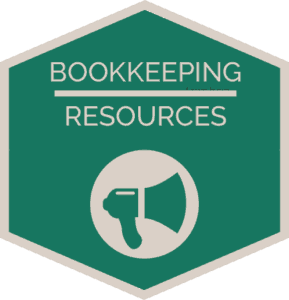You may be a freelancer or a solopreneur, but you should still have a separate business bank account.
A lot of my clients who are freelancers or entrepreneurs ask me if and when they should set up bank accounts and credit cards for their solopreneur business.
My answer? Yes – and as soon as humanly possible.
Not only does it make managing your money SO much easier – it also comes with perks you might not know about.
Here are four reasons why freelancers need a separate business bank account for their businesses:

1. Better Expense Tracking
Trying to make sense of a pile of receipts is time-consuming and frankly, not all that fun (ESPECIALLY if you’re a freelancer without a lot of extra help).
If you have a business-only bank account and credit card, it’s ALL RIGHT THERE (but hold onto your receipts, too, just in case!).
If you use a handy tool like QuickBooks Online to manage your books, you can link those business bank accounts to it and categorize all of your transactions quickly and easily.
If you need help setting up your QuickBooks Online account (and creating a totally customized bookkeeping system for your business) check out my signature VIB Day!
2. Less Painful Quarterly Taxes
If you’re a small business owner or freelancer/solopreneur, then you have to pay quarterly taxes. If you’ve been in business for longer than a year, you likely know how much you’re going to have to pay.
If you have a separate business bank account, you can make sure you always have that money ready to go without worrying about the fluctuations of your personal finances.
If you’re just starting out and are unsure about how much to set aside, do what I always tell my clients to do: squirrel away 30% of your earnings for tax time. You might not need the full amount once you factor in business deductions, but it’s better to have too much than too little.
Added bonus if you save more than you need for taxes? You can put it towards retirement savings which may be tax deductible – BAM – double win!
3. Rewards and Perks
So, as a freelancer, you might not be a business “on paper.”
Without things like a tax ID, you won’t be able to apply for business bank accounts.
However, you can still set up a separate bank account for your business. Just use a personal account – and look for something with relevant perks!
To clarify, when deciding where to open up a business bank account or credit card, think beyond the companies/banks you already do business with, and look for a rewards program that will best meet your business needs.
Travel a lot? Get a card that gives you miles or gas points.
Want cash back? There are tons of options there, too.
If you DO have a Tax ID number, then a whole world of perks is available to you when you set up business accounts, including cash, miles, and sign-up bonuses – as well as points towards rewards and tools for business needs like payroll and merchant services.
However, keep in mind that many business accounts come with monthly fees or minimum balances, so make sure you take those factors into consideration when choosing where to open your business bank account or credit card.
4. Opportunities for Business Financing
There may come a time when you want to grow and expand your business from freelancer to full-on agency, for example. In that case, you may need to borrow money from somewhere.
And to qualify for financing, you’ll need to meet certain income requirements. If you have separate accounts set up for your business and keep your bookkeeping records up-to-date, you’ll know at a glance what products you qualify for, and what you can realistically afford to pay back each month.
If you have a business bank account(s) set up, you’re more likely to get special offers on financing programs from the banks you do business with (and probably others, too). If you choose to borrow from a company that you already have accounts with, the process will likely be much easier and faster because they’ll already have access to all of your financial information.
So basically, get a separate business bank account – like, yesterday.
When it comes to running a small business, particularly as a freelancer or solopreneur, the easier you can make things for yourself, the better. Keeping your business and personal finances separate can save you a lot of time.
Plus, it will give you a much clearer picture of where you are with meeting your revenue goals, so you’ll know if you need to get out there and hustle more.
Set yourself up for success – get separate bank accounts for your business.
P.S. This post contains affiliate links for products we love!

